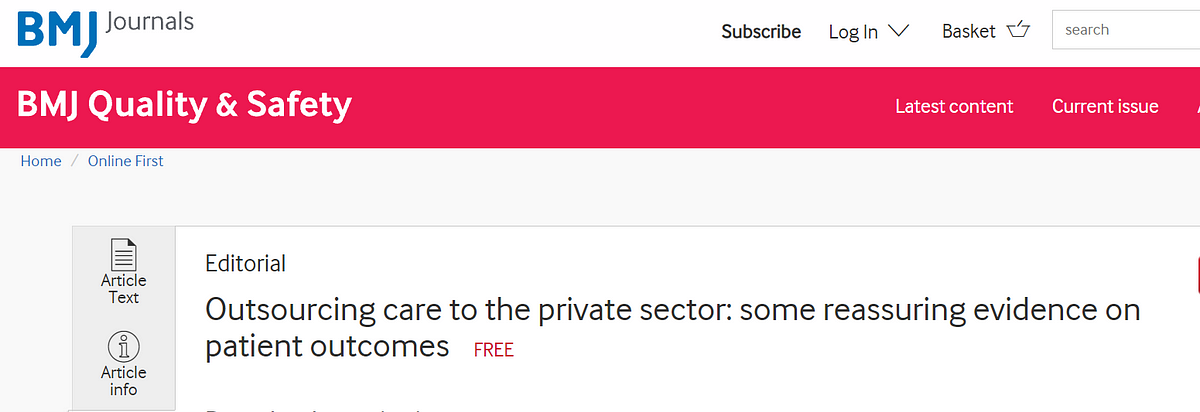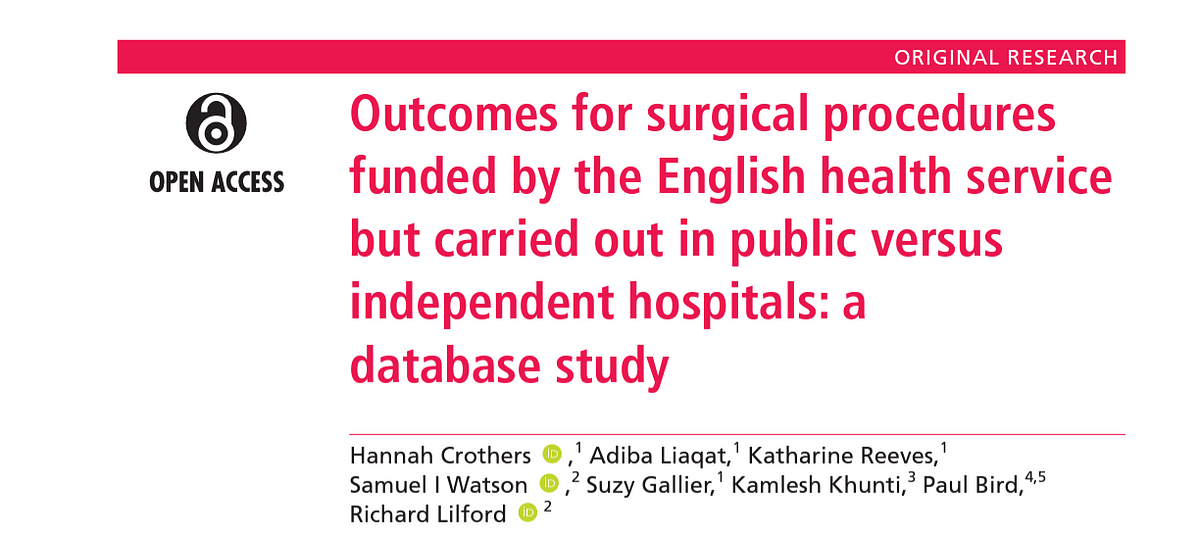The Lilford and colleagues study provides a strong reassurance that outsourced private care for NHS patients is at least as safe as that provided in NHS facilities.
The Health Strategist
the blog of Joaquim Cardoso, MSc.
October 24, 2021
homecaremag
This is an Executive Summary, adapted from the paper below, by Joaquim Cardoso, the editor of the blog The Health Strategist.
Bottle A, Browne J; Outsourcing care to the private sector: some reassuring evidence on patient outcomes; BMJ Quality & Safety Published Online First: 22 October 2021. doi: 10.1136/bmjqs-2021–014349
(Alex Bottle1, and John Browne2 )
Key messages
- A recent study by Lilford and Colleagues found that patients treated in the private sector had
(1) consistently shorter hospital stays and
(2) lower emergency readmission rates than those in NHS hospitals.(3) The absolute levels of death and readmission observed in both settings were low.
- The capacity crisis is likely to continue for the foreseeable future, and the NHS now has the additional stress of a huge backlog of elective surgery postponed due to the COVID-19 pandemic.
- There may also be a case for an incremental expansion of the NHS outsourcing programme given the excellent quality and safety results observed.
- Any expansion should move hand in hand with performance monitoring.
- The study by Lilford and colleagues is a testament to the value of data. This transparency should be a model for all private healthcare activity in England, including that provided outside the NHS outsourcing programme.
When was outsourcing of care introduced in the UK? What is the scale?
Outsorcing in the UK was introduced in 2003 to (1) cut waiting times for high-volume surgical and (2) diagnostic procedures, a range of privately owned healthcare providers were contracted to provide services that are free at the point of access to NHS patients.
The scale of capacity boost is modest, accounting for less than 10% of all elective procedures carried out using public funding.
However, the absolute amount of healthcare purchased by English NHS Trusts from independent providers continues to grow steadily, although from a low baseline.
What is the debate about outsourcing of care?
The use of private facilities to boost public sector capacity in England, where government-funded healthcare through the NHS is available to all citizens regardless of their income or employment status, has long been politically controversial.
Fears have been expressed that current policy will lead to a form of privatisation, where private providers are contracted to run select NHS facilities, or that outsourcing grows to the point where the financial viability of some NHS providers is undermined. 2
There are also concerns around the impact of an enlarged private sector on workforce supply for the NHS and around the value for money of contracts agreed with the private sector. 3
Finally, there are concerns about the extent to which streaming low-risk patients away from NHS facilities may affect training opportunities for junior NHS clinicians. 4
What should be the role of the private sector in the provision of health care services?
The role of the private sector remains a part of the ever-present debate about the optimal organisation of the NHS.
A further issue is the quality and safety of care provided to NHS patients by private providers.
- At the start of the outsourcing programme there was dissatisfaction with monitoring arrangements, and anecdotal evidence was presented about high rates of surgical complications in some private hospitals. 5
- Subsequent cohort studies were reassuring and suggested that outcomes at private facilities were in fact superior for some patient groups.
However, these studies are now either out of date or examined only specific procedures. 6–10
What is the new evidence about outsourced care services in the UK?
The evidence base as a whole, including the current study, provides a strong reassurance that outsourced private care for NHS patients is at least as safe as that provided in NHS facilities.
The study team selected 18 procedures performed with sufficient volume and with non-negligible risk before using regression and propensity score matching to compare outcomes in NHS and private facilities.
They found that patients treated in the private sector had
(1) consistently shorter hospital stays and
(2) lower emergency readmission rates than those in NHS hospitals.
Findings that were less consistent across operations were a higher emergency interhospital transfer rate in the private sector, and higher in-hospital death and non-emergency interhospital transfer rates in NHS hospitals.
(3) The absolute levels of death and readmission observed in both settings were low.
What can we learn about the health care data sources in the UK, from this study?
In this issue of BMJQS, Lilford and colleagues 11 make use of the national hospital administrative database for England, Hospital Episode Statistics (HES), to provide the largest and most comprehensive study to date in this field. HES has the advantage of having mandatory submission and national coverage, including all NHS patients treated in the private sector.
It uses the International Classification of Diseases 10th Revision medical classification to capture diagnoses, including comorbidities and complications, and its own system, the Office of Population Censuses and Surveys (OPCS) Classification of Interventions and Procedures (version 4), to capture procedures.
How was the methodology of the study? What is the debate?
To learn about the methodology, refer to the original publication.
What is the context of health care capacity issues in the UK, post covid-19?
The capacity crisis is likely to continue for the foreseeable future, and the NHS now has the additional stress of a huge backlog of elective surgery postponed due to the COVID-19 pandemic.
- The British Medical Association estimates that, between April 2020 and March 2021, there were 3.5 million fewer elective procedures than in the previous year, 14 with the total number of patients waiting for a procedure in England topping 5 million in April 2021. 15
- The rest of the UK and many other countries face similar pressures.
Where it is clinically appropriate to do so, the NHS will need the help of the independent sector for years to come.
Any expansion of outsourcing will have to be done carefully to ensure that patients continue to be treated in the most appropriate setting.
What is the implication of the results of this study, in the current capacity shortage context?
This is a good news story for policymakers and should be celebrated-extra capacity is delivered to a high-quality standard while remaining free to NHS patients at the point of care.
Legitimate concerns about the current outsourcing model remain, but the debate should now focus on broader policy issues such as value for money and the impact on training pathways.
Now that these concerns have been alleviated there may be some learning points from the private sector around processes to increase patient flow.
There may also be a case for an incremental expansion of the NHS outsourcing programme given the excellent quality and safety results observed.
Now … there may be some learning points from the private sector around processes to increase patient flow.
What are the recommendations, and points of attention?
Clearly, the current patient selection processes and pathways are working, but we may already be at the limits of who can be safely cared for in the private sector.
Any expansion should move hand in hand with performance monitoring. It is not good enough to leave the analysis of data in this area to occasional publications by interested academics: responsibility for oversight should now transfer to healthcare regulators for robust risk-adjusted evaluation on a regular basis.
Any expansion should move hand in hand with performance monitoring.
What are the lessons learned from the study about the importance of data?
The study by Lilford and colleagues is a testament to the value of data.
It can be argued that the NHS is one of the most monitored and transparent healthcare systems in the world. It is for this reason that we know a lot about its performance at different levels and in comparison with other sectors.
This transparency should be a model for all private healthcare activity in England, including that provided outside the NHS outsourcing programme.
References
See the original publication
ORIGINAL PUBLICATION
_________________________________________________________

Outsourcing care to the private sector: some reassuring evidence on patient outcomes.
This study provides a strong reassurance that outsourced private care for NHS patients is at least as safe as that provided in NHS facilities.
BMJ Quality and Safety
Alex Bottle1,
John Browne2
October 12, 2021
homecaremag
Authors afilliations
1 School of Public Health, Imperial College, London, UK
2 Epidemiology and Public Health, University College Cork, Cork, Ireland
Cite the original article as:
Bottle A, Browne J; Outsourcing care to the private sector: some reassuring evidence on patient outcomes; BMJ Quality & Safety Published Online First: 22 October 2021. doi: 10.1136/bmjqs-2021–014349
Originally published at https://qualitysafety.bmj.com on October 21, 2021.
REFERENCE PUBLICATION

Crothers H, Liaqat A, Reeves K, et al. Outcomes for surgical procedures funded by the English health service but carried out in public versus independent hospitals: a database study. BMJ Qual Saf 2021. doi:10.1136/bmjqs-2021–013522. [Epub ahead of print: 07 Sep 2021].












